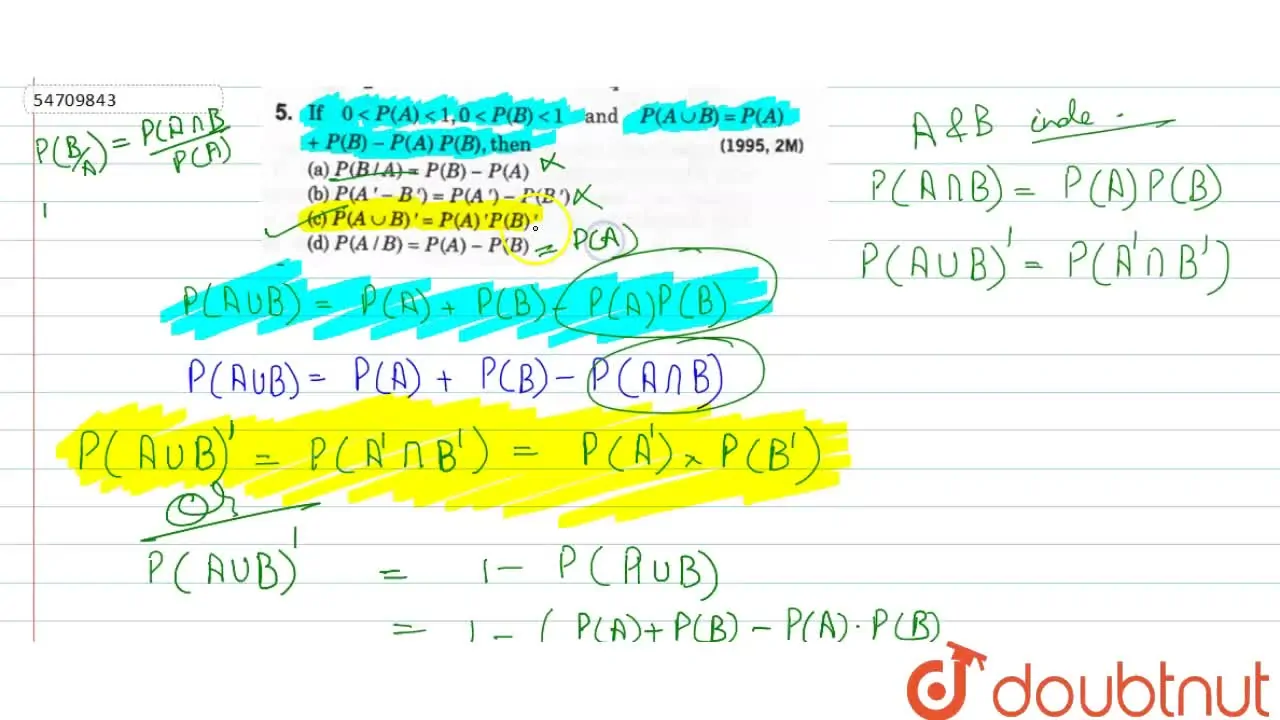If 0<P(A)<1,0<P(B)<1 and P(A∪B)=P(A)+P(B)−P(A)P(B), then
P(A/B)=P(A)+P(B)
P(A∪B)c=P(Ac)P(Bc)
P(Ac−Bc)=P(Ac)P(Bc)
P(B/A)=P(B)−P(A)
The correct Answer is:B
We have,
P(A∪B)=P(A)+P(B)−P(A)P(B)
⇒P(A)+P(B)−P(A∩B)=P(A)+P(B)−P(A)P(B)
⇒P(A∩B)=P(A)P(B)
⇒ A and B are independent events
⇒Ac and Bc are independent events
⇒(Ac∩Bc)=P(Ac)P(Bc)
⇒P(A∪B)c=P(Ac)P(Bc)
Hence, option (b) is true.
Related Playlists
- BOOK - OBJECTIVE RD SHARMACHAPTER - PROBABILITY EXERCISE - Section- II (Assertion -Reason Types MCQs)15videos
PROBABILITY
- BOOK - OBJECTIVE RD SHARMACHAPTER - PROBABILITY EXERCISE - Section I - Mcqs94videos
PROBABILITY
- BOOK - OBJECTIVE RD SHARMACHAPTER - PROBABILITY EXERCISE - Chapter Test45videos
PROBABILITY
- BOOK - OBJECTIVE RD SHARMACHAPTER - PERMUTATIONS AND COMBINATIONSEXERCISE - Chapter Test60videos
PERMUTATIONS AND COMBINATIONS
- BOOK - OBJECTIVE RD SHARMACHAPTER - QUADRATIC EXPRESSIONS AND EQUATIONS EXERCISE - Chapter Test50videos
QUADRATIC EXPRESSIONS AND EQUATIONS
Similar Questions
If 0<P(A)<1,0<P(B)<1 and P(A∪B)=P(A)+P(B)−P(A)P(B), then
View SolutionLet 0 lt P(A) lt 1, 0 lt P(B) lt 1 and P(A∪B) = P(A) + P(B) - P(A) P(B). Then
View SolutionIf 0<P(A)<1,0<P(B)<1 and P(A∪B)=P(A)+P(B)−P(A)P(B), then
View SolutionLet 0<P(A)<1,0<P(B)<1 and P(A∪B)=P(A)+P(B)−P(A)P(B), then :
View SolutionLet 0<P(A)<1,0<P(B)<1and P(A∪B)=P(A)+P(B)−P(A)⋅P(B) then
(A)P(B/A)=P(B)−P(A)
(B)P(Ac−Bc)−P(Ac)−P(Bc),
(C)P(A∪B)c=P(Ac)⋅P(Bc)
(D) P(A/B)=P(A)View SolutionIf 0<P(A)<1,0<P(B)<1 and P(A∪B)=P(A)+P(B)−P(A)P(B) then
View SolutionIf P(B)=35,P(A/B)=12 and P(A∪B)=45 , then P(A∪B)'+P(A'∪B) is equal to :
View SolutionIf P(A)=13,P(B)=15andP(A∩B)=115, then find P(A∪B).
View SolutionSuppose A and B are two events such that 0<P(B)<1. If P(A∣B')=P(A)1−P(B) then which one of the following is not true?
View Solution1.If P(B/A)=P(B) and P(A)!=0 P(B)!=0 then
View Solution


